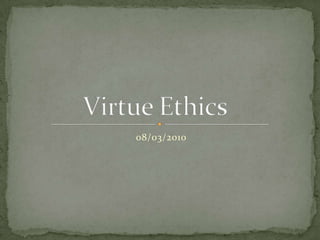
Virtue Ethics
- 2. Aristotle G. E. M. Anscombe and Peter Geach Philippa Foot
- 3. Accommodates the natural concern many of have with being good a good person …in addition to merely performing right acts (producing good consequences, following moral rules) Acting well vs. Acting rightly Virtue Ethics
- 4. Virtue Ethics Often describes actions in the virtue and vice terms “Torture is cruel” “Paying back your debts is just” “Speaking up in that situation was courageous” Anscombe suggested that this is a great improvement over “morally wrong” (or “right”), because this language still informs us about what we ought and ought not to do.
- 5. More than Actions The virtue (and vice) terms do not merely apply to the outward action, but to the state of character of the agent. When a store manager practices business in an honest fashion because this is a good way to attract customers and maximize profits, we don’t quite want to say that he is acting honestly, or that he is a man of honest character. Being virtuous doesn’t simply mean “prone to act in good ways” Being honest does not only mean “tends to tell the truth”
- 6. 1: Good-making property Makes one good “qua” human Because we are, by nature, rational and social beings, the virtues help us fulfill our human nature. Important for achieving a good life, or eudaimonia. What is a Virtue?
- 7. 2: Goodness of the Rational Will Concerns reason and rational choice Not a mere pre-reflective inclination to do well. This implies that virtue is something more than what nice children are capable of having. What is a Virtue?
- 8. 3: A Corrective Supplement human beings where they find natural temptations, deficiencies of motivation, or tendencies toward vice. Justice is a corrective where we want to keep things we don’t deserve or distribute things (like punishment) in a way that others don’t deserve; Courage is a corrective where we have the tendency to be overcome by fear; Charity is a corrective where we tend to be selfish or uncaring of others. This suggests that knowing the virtues depends on knowing what human nature is like What is a Virtue?
- 9. 1: Habit Reliability and Consistency Virtues are developed, not acquired at once Virtues are strongly entrenched Components of Virtue
- 10. 2: Sensitivity to Reasons Virtue involves seeing certain considerations as practical reasons, and being motivated by and acting on them. Seeing the humanity of others as reason to not to harm or lie to them. Seeing another’s vulnerability as a reason to help, not to take advantage. Seeing the value of truth as reason to conduct business honestly. Components of Virtue
- 11. 3: Emotions and Attitudes You are happy to perform virtuous deeds You are attracted to other virtuous people The vicious behavior of your friends and family makes you sad. Note the contrast here with Kant’s ethics: on virtue ethics, subjective desires to do the right thing tend to make someone more virtuous. Components of Virtue
- 12. 4: Natural Inclination to Act Well Virtuous actions come naturally No need to battle contrary desires Spontaneous expression of one’s innermost desires Components of Virtue
- 13. 5: Phronesis: Practical Wisdom The ability to reason correctly to make wise choices Requires knowledge and life experience Solves conflicts between the virtues (or moral rules) Supplements mere “natural virtue”: it perfects (is a check on) the spontaneous component. Components of Virtue
- 14. 1: Habit 2: Sensitivity to Reasons 3: Emotions and Attitudes 4: Natural Inclincation to Act 5: Phronesis: Practical Wisdom Recap: Five Components of Virtue
- 15. Virtue?
- 16. Virtue?
- 17. Virtue?
- 18. Virtue?
- 19. Virtue > Continence Continence = Strength of Will But virtue, for the virtuous person, should be easy Exercise of will-power implies imperfect virtue: No virtuous habit formed Wrong motives and attitudes Not naturally inclined to act well But is this always the case?
- 20. “[We] both are and are not inclined to think that the harder a man finds it to act virtuously the more virtue he shows if he does act well. For on the one hand great virtue is needed where it is particularly hard to act virtuously; yet on the other it could be argued that difficulty in acting virtuously shows that the agent is imperfect in virtue.” Philippa Foot, “Virtues and Vices” The Puzzle
- 21. “The dilemma can be resolved only when we stop talking about difficulties standing in the way of virtuous action as if they were of only one kind.” Foot's Solution
- 22. Consider the following: A woman finds a purse on the street with lots of money in it, and is temped to take it because… (a) she is a poor single mother with hungry children at home (b) she is struggling with kleptomania (the desire to steal) Foot's Solution
- 23. In (a) it is the woman’s circumstances that makes it hard to act rightly. Even further, an important factor contributing to the difficulty is her love and concern for her children, which is a sign of virtue. So, we can imagine that even someone with full virtue would find this situation difficult. In fact we might think less of the woman if she weren’t tempted by the purse. Circumstances vs. Character
- 24. In (b) it is the woman’s vicious character that makes it hard to act rightly. Assuming that she did not need the money to feed her children, the prospect of taking the purse should not quite have occurred to her if she were fully virtuous. Circumstances vs. Character
- 25. A virtue is… 1: A good-making property 2: Goodness of the rational will 3: A corrective Review
- 26. Components of Virtue 1: Habit 2: Sensitivity to Reasons 3: Emotions and Attitudes 4: Natural Inclination to Act 5: Phronesis: Practical Wisdom Review